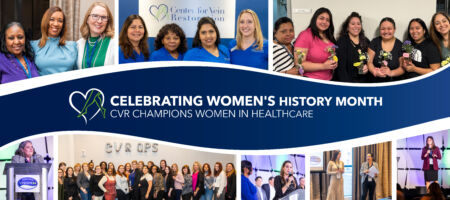
March is Women's History Month, a time to celebrate the accomplishments and contributions of women throughout history. At Center for Vein Restoration, we take pride in our commitment to the growth and empowerment of women in healthcare. As we reflect on the history of women in medicine and their ongoing contributions, we recognize their invaluable role in shaping the future of medicine, especially as it relates to venous and lymphatic health and the vital contributions of women at Center for Vein Restoration (CVR).
The history of women in medicine is a testament to resilience, determination, and perseverance in the face of adversity. Despite facing numerous challenges and barriers, women have made significant strides in healthcare throughout the centuries.
This Women's History Month, we would like to recognize and honor a mere fraction of the countless women who have dedicated their lives to advancing healthcare and improving the lives of others. Their contributions inspire Center for Vein Restoration’s pursuit of providing the highest-quality vein care, compassionately and affordably, while promoting gender equality and diversity in the healthcare industry. CVR offers a variety of nearly pain-free solutions to eliminate unsightly and uncomfortable varicose veins.
Call 240-965-3915 to speak to a Patient Services Representative or schedule your consultation online at a CVR near you today.

Let's delve into stories of just a few of the extraordinary women who blazed an early trail and paved the way for modern-day medicine:
Building on the accomplishments of these early trailblazers, the 20th century saw a significant increase in the number of women entering the medical field. These are just a few of the many female physicians who made substantial contributions and a lasting impact on healthcare today:
According to the NIH, women play a dominant role in healthcare today, constituting three-quarters of healthcare workers in the United States. Women outnumber men and excel in various healthcare professions, such as nursing, speech pathology, and occupational therapy.
At Center for Vein Restoration, America’s largest physician-led vein center, 80 percent of the staff are female. Eighty-seven percent of CVR’s vascular technologists are female, and 40 percent of CVR’s medical providers are female.
In addition to CVR’s board-certified vein physicians, CVR’s leadership skews female, with 87 percent of directors and two-thirds of vice-presidents being women.
At Center for Vein Restoration, we are proud to have a team of talented and dedicated healthcare professionals, including many women who are leaders in research and advancement in venous insufficiency, including females pursuing a Fellowship in Venous and Lymphatic Medicine at CVR.
Women's History Month reminds us of the remarkable achievements and contributions of women in healthcare. From ancient healers to modern-day physicians, women have played a pivotal role in shaping the field of medicine and improving healthcare outcomes for all.
Their contributions inspire CVR to continue our mission of providing high-quality vein care while promoting gender equality and diversity in the healthcare industry. And as we look to the future, let us continue to celebrate and support the women who are making a difference by advancing healthcare and improving the lives of others.
Many CVR vein clinics have an all-female staff. Call 240-965-3915 to speak to a Patient Services Representative to locate a vein clinic near you that is staffed entirely by women.
CVR accepts many insurances, including Aetna, Amerigroup, Anthem, Blue Cross/Blue Shield, Cigna, MultiPlan, Medicaid, Medicare, and more.
From physicians and nurses to vascular technologists, researchers, and administrators at Center for Vein Restoration, women play a crucial role in providing quality vein care to patients—every day.
